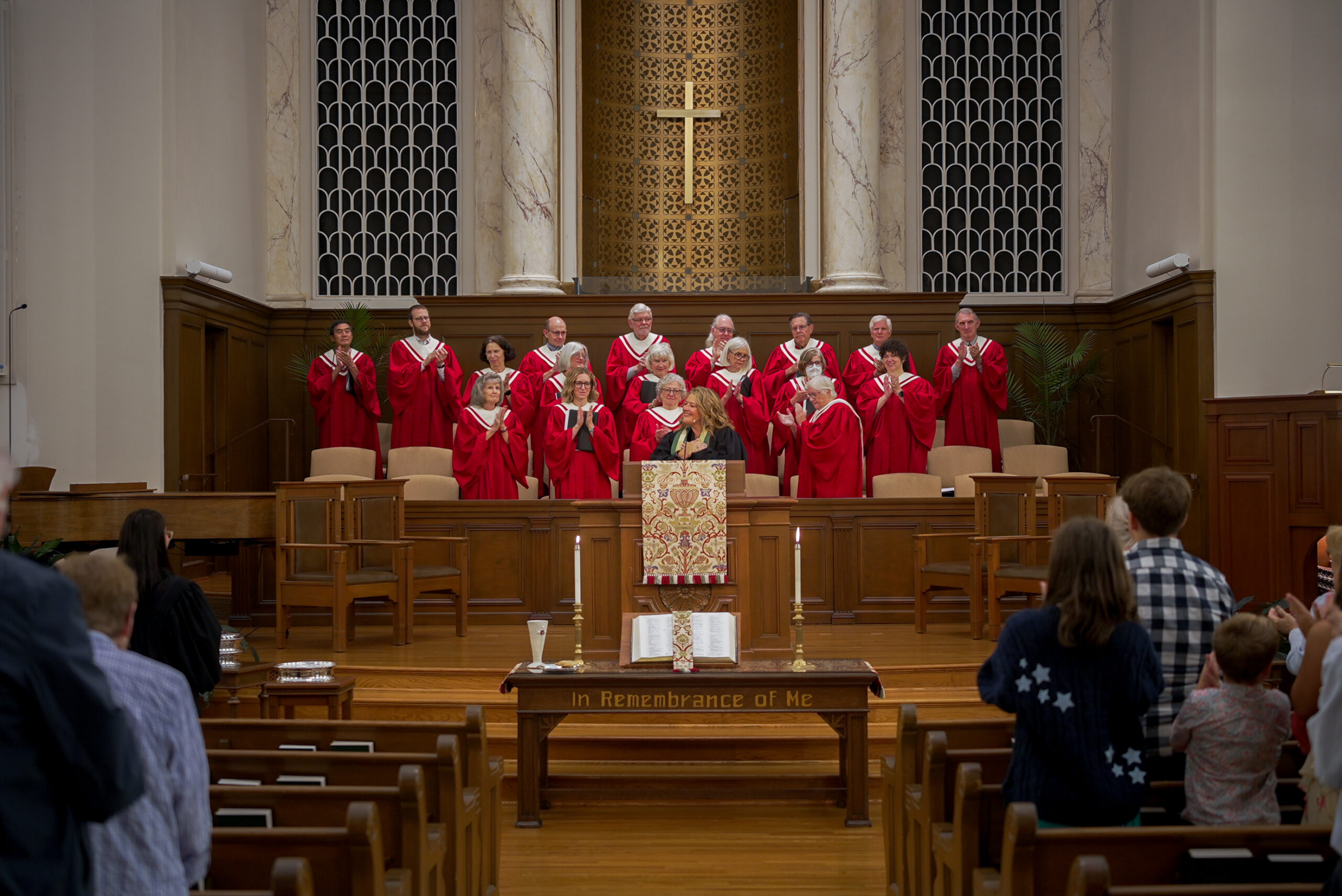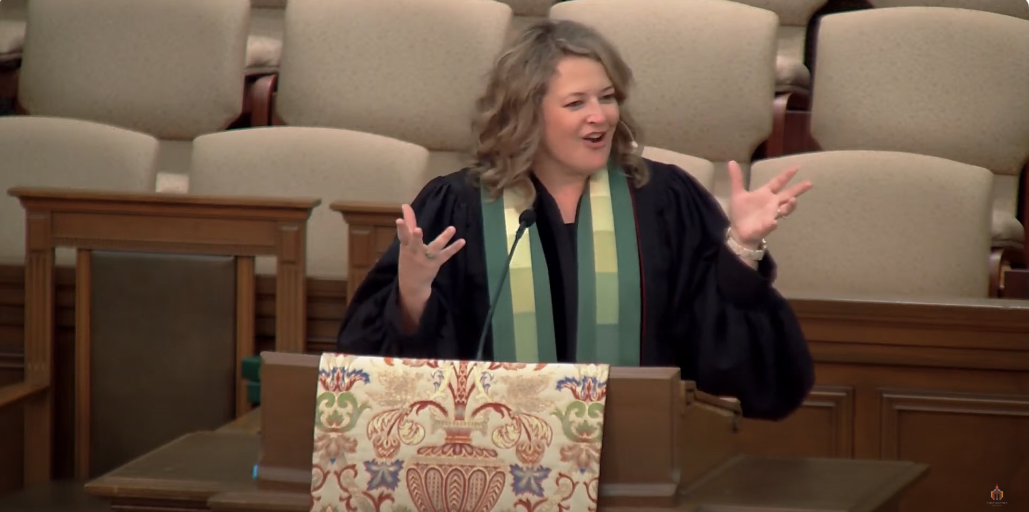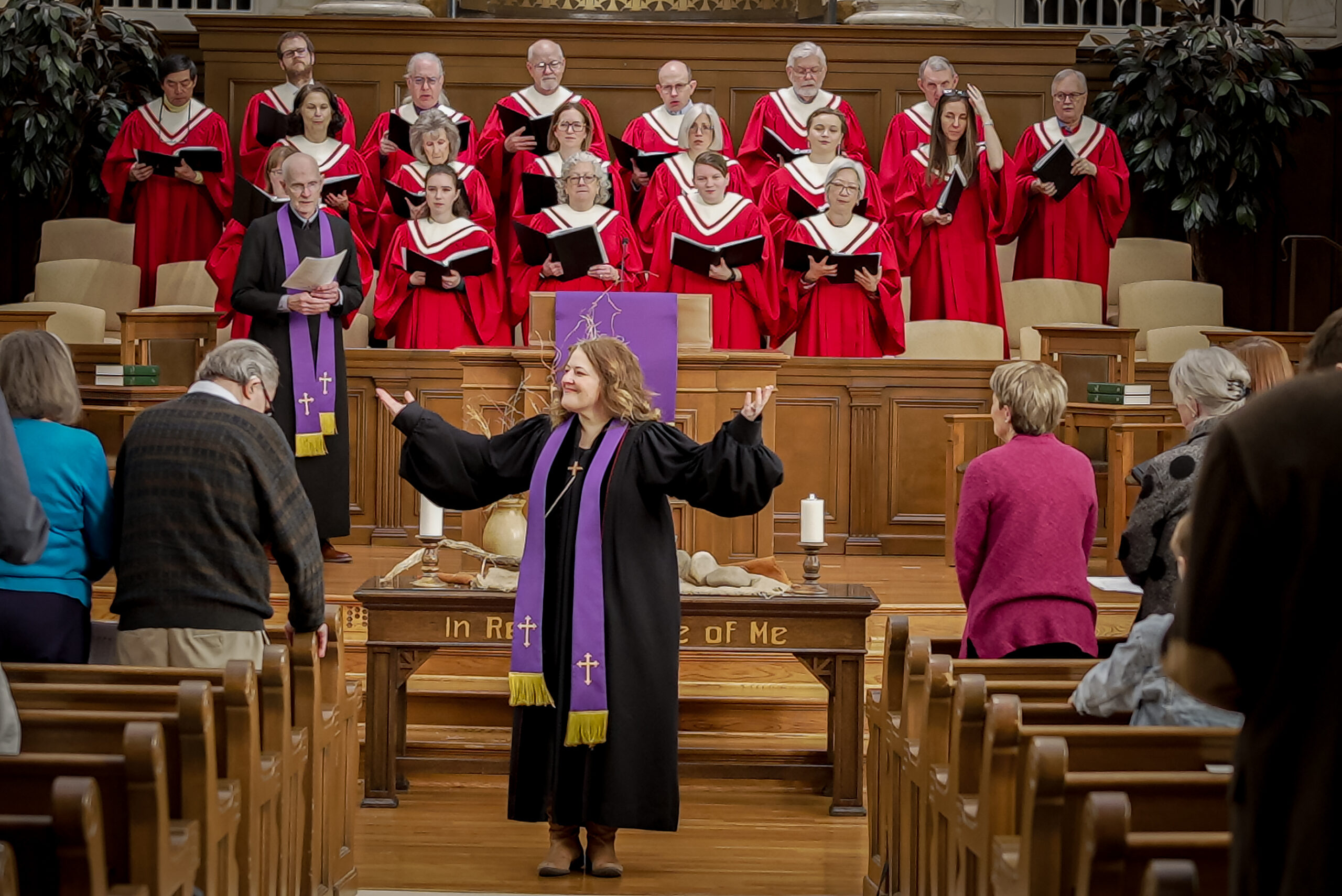I.It was a Tuesday – September 5, 1882 to be specific – that New York City celebrated its first Labor Day. You see, pressure had been applied to local leaders, in part from a massive march of sweatshop workers in New York who demanded that the 12 to 14-hour workday be shortened. “Eight hours for work, eight hours for rest, eight hours for what we will,” was their chant. And to their dismay, the workers’ demand was deemed wildly unreasonable – radical even! – by elected officials and industry leaders alike.
New York City held a Labor Day parade again in 1883, and within a couple of years, this idea had caught on across the country – that idea of a day to celebrate the labor of American workers and advocate for a better balance between work and non-work. In the years that followed, a riot in Chicago and railway strikes around the country produced a rising tide of discontent among workers so pronounced, it prompted President Grover Cleveland, along with Congress, to approve a law recognizing Labor Day on June 28, 1894 as a holiday.
Though the holiday has evolved over the years – seen now as the hinge between summer and fall, a weekend to fill with barbecues and final trips to the pool and shopping the sales and wearing white for the last time – it gives us pause. For 130 years later, here we are: a country, a people, still with an ever-complicated relationship with work and rest.
II.We don’t have to look far to realize just how complicated that relationship is. Some of us have too much work and not enough rest; others, too much rest and not enough work. Most of us move between these two poles. Some of us wish the work we had was different, or steadier, or more financially viable, or more flexible to our needs. Others of us name that work has oozed into nearly every corner of our lives, and rest can only be possible when the vacation responder goes up on email. It’s even likely that some of us are part of the majority of working Americans who dislike their job, or the vast majority of working Americans who put in well over 40 hours of work per week, or the 70% who have experienced burnout in the past year, or the more than half of working Americans who don’t take all their vacation days each year or have a side hustle to supplement their full-time income.
Beyond employment labor, there’s household labor. Because of the nature of our lives and families, some of us labor primarily in the home – as caregivers for the young or the old, the infirm or the disadvantaged. Others of us wish we could work, but our bodies or our minds or our responsibilities keep us close to home. And when employment is through, some of us retire happily for what adventure comes next, while others retire anxiously with minds on money, or retire briefly because a life without paid employment is so foreign, it becomes uncomfortable, or retire involuntarily as our jobs are outsourced, or retire ambiguously, unable to consider who we are outside of what we do.
Needless to say, we have a love-hate relationship with our work and non-work, our work and rest. Journalist Derek Thompson highlights one part of this dysfunctional relationship by addressing the American bent toward “workism.” “Workism,” as he defines it, “is the belief that work is not only necessary to economic production, but also the centerpiece of one’s identity and life’s purpose.” Indeed, for centuries, work has served simple purposes: to provide means for basic necessities (food, shelter, clothing) and something purposeful to fill our days. Yet over time, work has come to matter deeply to our self-expression, our identity, our perceived place in the landscape of things, our need to express, our sense that we matter and count in this world.
Yet even on this weekend when our country marks the impact of workers, it’s worth remembering today that our relationship to work and rest is, or at least should be, informed by our relationship with God, right? And that a Protestant work ethic doesn’t mean trying to earn our way into God’s favor, right?
III.The Bible is full of stories and directions about work and rest, but there are two particular pieces of good news I’d like for us to consider today. The first bit of good news is this: work is not owned, but shared. “Come to me,” Jesus says in the Gospel of Matthew, “you who are weary and carrying heavy burdens, and I will give you rest. Take my yoke upon you, and learn from me; for I am gentle and humble in heart, and you will find rest for your souls. For my yoke is easy, and my burden is light.”
Perhaps, like me, you’ve heard this text over the years and felt a deep breath rise up in you when you read it. “Ahhhh,” you might think, “Jesus says to give him our troubles! Put our labor on him! I feel the relief already.” Yet let’s give ourselves a refresher about this text, particularly how a yoke works. A single yoke is an efficient tool – a wooden bar or frame, placed on one creature’s shoulders to carry heavy items on either side. But a shared yoke joins two animals together to pull a heavy load. Farmers often would use shared yokes to pair up a more experienced animal with a newbie, one training the other in how best to pull the weight of the plow. This kind of yoke doesn’t take away the weight, it balances it. It distributes it more evenly. It takes the burden and makes it “suitable” or “appropriate,” both of these terms part of the Greek translation here of Jesus’ burden being “easy.” It’s a burden that strengthens rather than depletes, that builds up rather than tears down.
If you read these few verses carefully, you’ll notice that there’s no specified audience that Jesus is talking to, almost as if he is speaking through time and space to whomever needs to hear it. You’ll also see that Jesus doesn’t say, “give me all your burdens, and I’ll take them away,” rather he says “bring your burdens to me, for my burden is light.” He doesn’t say “you’ll never again bear burdens,” but rather, “your labor will not be in vain. It matters to me. I see you.” He doesn’t say “give your yoke to me,” but rather, “take my yoke upon you.”
You know, for as many times as I read this text through the years of my life, I never heard it like this until after my sabbatical two summers ago. In the season when I was trying to relearn how to work without overwork, without workism, without thinking that work – even the most meaningful kind – was just mine to do, taking on Jesus’s yoke was precisely the message I needed. I hear in this good word a promise that labor – any labor – is never just an individual’s to bear.
So friends, when the emails and reports pile up, when the meetings never seem to end and the tasks never seem to be completed, when the clients get anxious and the customers get mad, when your lists grow, and your hands and feet get weary, and your back aches, and you think you can’t do one more thing for anyone else, give up the solo labor. Stop trying to take it all on yourself; instead, take Jesus’s yoke upon you. Let him share the load.
How?, you might wonder. Maybe you take on Jesus’ Spirit, by taking a deep breath before you send that email. Maybe you take on Jesus’s compassion, by remembering that what you see from people at work is the very tip of the iceberg to what they’re carrying each day and committing to be as kind as you are able to each person you encounter. Maybe you take on Jesus’s boldness, stepping away from work to tend to your own needs even when you feel like you can’t, even before your bandwidth is entirely maxed out, even before a crisis. Maybe you take on Jesus’s attention, recognizing that for you, retirement can too easily slide into lethargy and choosing instead to fill these retirement days with the kind of things Jesus did and the people Jesus loved. Maybe you take on Jesus’s boundaries, by following the lead of my former colleague, Nina, who once talked about how anxiety affects us, and how we respond. As she said, “you can be a china cup or a sponge!” A sponge lets anxiety seep into every corner, distending and disguising you so much, you have to be wrung all the way out to return to normal. A china cup, on the other hand, fills to the brim and doesn’t take on any more. When we would have particularly stressful staff meetings or hard seasons in the church’s life, she’d look at the staff and just do this [motion like you’re dumping out a teacup].
The good news is this: work is not owned, but shared.
IV.The second bit of good news is this: rest is not earned, but given.
Exodus 16 should sound familiar to you from the past few weeks, if only because Jesus made regular reference to it as he talked about bread and nourishment in John 6. Here, we’re thick into the story of the Israelites and their liberation from slavery enforced by Pharaoh. Some six weeks prior, Moses led the Israelites out of Egypt, and for the first time in as long as anyone can remember, they were liberated! Saved from the back-breaking labor, and released to live new lives of freedom.
Perhaps it shouldn’t surprise us to learn that weeks into their freedom and days into their trek across the wilderness, the Israelites began to complain in perhaps the most epic case of being hangry in human history. “If only we’d died in Egypt, we wouldn’t be so hungry!,” they whined. “In Egypt, we had enough! In Egypt, we knew what to expect! In Egypt, we had our fill! You brought us out here into this wilderness, Moses, and now we’re starving!” A crisis of provision leads to a crisis of faith. But there, God provided: manna by day, quail by night.
Jewish scholar Aviva Zornberg teaches us that the Hebrew words from which we get the word, manna, literally translates to, “What is it?” Or rather, “they did not know what it was.” Another scholar posits that they saw that frosty substance clearly, but couldn’t fathom how in the world it could sustain them. It’s here in that place – between the baffled response, the dissonance between need and supply – that we find our “daily bread,” six days of manna from God, as if we need both the secret and the sustenance to understand what it means.
But what happens on day seven? The text tells us that again, the people went out to gather it up, yet on this day, there was none. Moses had warned them the day before when they were to gather two days’ worth of manna, but perhaps the people didn’t believe. Didn’t trust. Didn’t remember. The Lord said to Moses, “how long will you refuse to keep my commandments and instruction?” Meaning: didn’t I tell you this already? The Lord has given you the Sabbath! It is gift! Tied to the rhythm of creation. Liberated from the labor that defines every other day. Provided by the same God who gave manna, not to hoard or hold, but as gift to use for nourishment. So too is the sabbath given freely and faithfully.
I read a story this week of a pastor who was reflecting on the common practice he does of meeting with families when their loved one has died. In each meeting, he points to their loved one’s legacy, asking, “what will you remember most vividly about your loved one? What have they left behind that you might carry forward?”
At least 80 percent of the time, he said, the families respond by telling him that their loved ones worked hard. “They worked extremely hard their entire lives” —and no matter what follow up questions he asks, that’s their summary. That’s their legacy. Hard work. In reflection, this pastor wrote: “We 21st-century Americans have created a culture of work so burdensome, people’s entire lives—their entire lifetimes—are dominated by its demands. There is no space left to breathe. To rest. To love and be loved. To flourish as human beings.”
Friends, God didn’t just give the gift of sabbath, of rest, to the Israelites; God gives the gift of rest to us too! And not just when we think we’ve earned it. No – regularly. Repeatedly. Sabbath invites us into a different realm of being – not because work is bad, but because the interplay of work and rest is so good. Sabbath takes the oppression of the clock, the sharp angles and lines of work, the relentless drumbeat of productivity and hurry, the rules of routine… and relaxes them. Makes them more tender and pliable and quiet, so that we who practice sabbath can hear God’s voice in a wholly new, life-giving way. Wayne Muller once said, “Sabbath is not dependent on our readiness to stop. We do not stop when we are finished. We do not stop when we complete our phone calls, finish our project, get through this stack of messages, or get out this report that is due tomorrow. We stop because it is time to stop.”
How?, you ask. How can I trust that gift of rest? Maybe you realize you are struggling with control, and decide to actually trust that God’s got you. Maybe you ask yourself, “what am I so afraid will happen if I stop?” Maybe you realize that what you’ve called “rest” is really just paralysis: scrolling on your phone, watching TV for hours on your couch, freezing after the unrelenting hustle of your work week and actually not resting at all. Maybe you figure out what practices renew you – gardening, reading, cooking, time with friends, going for a walk, whatever it is! – and do those as rest! Maybe you are like the Psalmist who “eats the bread of anxious toil;” what if you believed God’s provision of daily manna is real, even – especially! – on the day you don’t do anything to earn it?
V.“Ora et labora,” the Benedictine monks said long ago, bending the rhythm of their days around devotion to “praying and working.” In that spirit, I shared with our staff this week one of my favorite reflections on work and rest, called “The Nuns’ 23rd Psalm.” Let me end with that today, and let it be our prayer, our good news, our hope for the rhythm of life abundant.
The Lord is my pace-setter, I shall not rush.
He makes me stop and rest for quiet intervals;
He provides me with images of stillness, which restore my serenity.
He leads me in ways of efficiency through calmness of mind.
And His guidance is peace.
Even though I have a great many things to accomplish each day,
I will not fret, for His presence is here.
His timelessness, his all-importance will keep me in balance.
He prepares refreshment and renewal in the midst of my activity
By anointing my mind with His oils of tranquility.
My cup of joyous energy overflows.
Surely harmony and effectiveness shall be the fruit of my hours for I shall walk in the place of my Lord and dwell in the Lord’s house forever.




